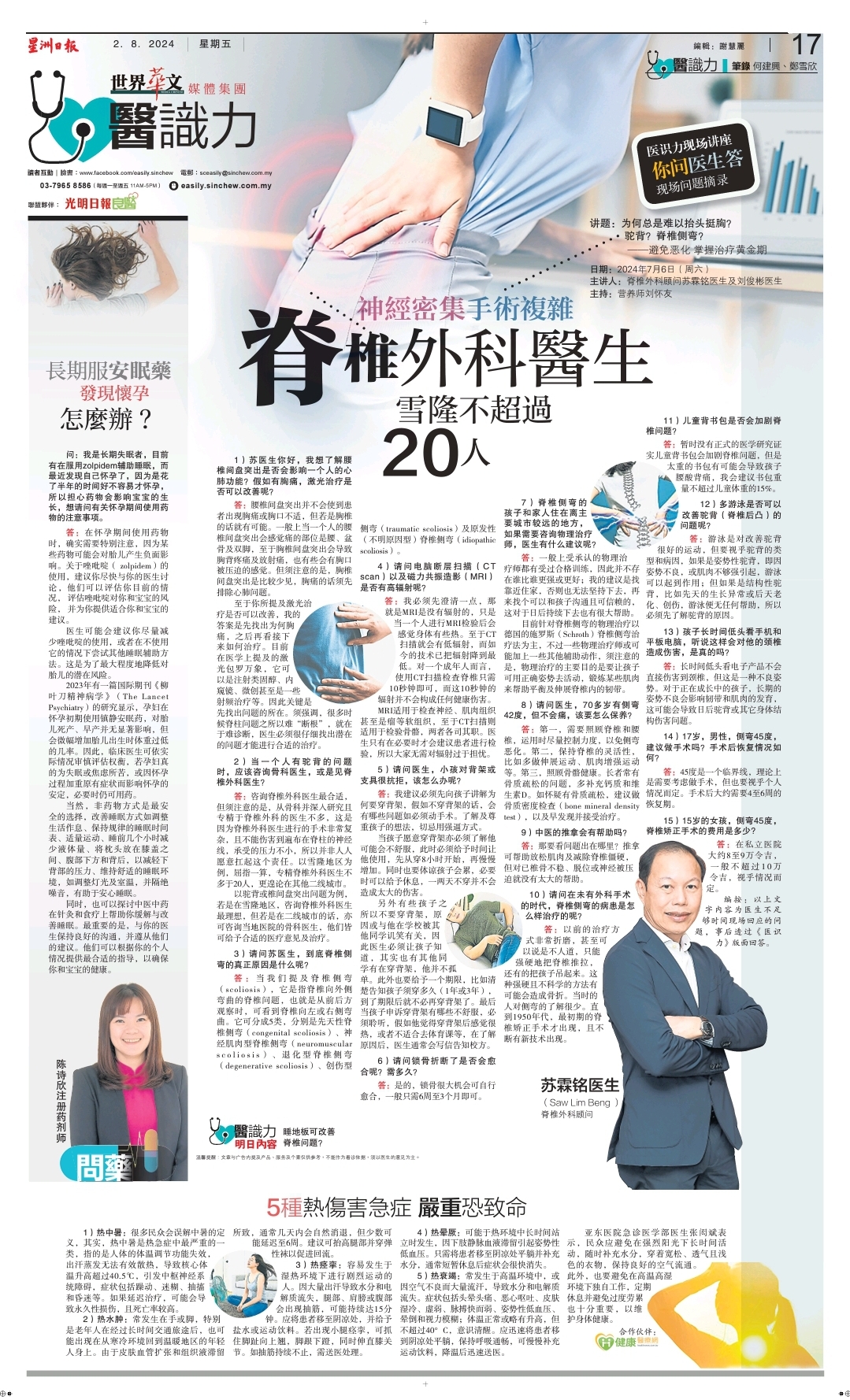Nerve-Intensive Surgeries Are Complex, and There Are No More Than 20 Spine Surgeons In KL and Selangor
02 August 2024

This article is an excerpt of a question from the floor after a live health talk held by the Sin Chew Daily Easily team on 6 July 2024. It mainly records the questions asked by the audience and the answers given by Dr Saw Lim Beng regarding on Scoliosis.
Hi Dr Saw, I would like to know if a herniated disc in the lumbar spine affects a person's cardiorespiratory function? If there is chest pain, can laser treatment improve it?
A: A herniated disc in the lumbar spine does not cause chest pain or discomfort in the chest, but it can in the thoracic spine. Generally, when a person has a herniated disc in the lumbar spine, he or she will feel pain in the lower back, pelvic bone, and feet, while a herniated disc in the thoracic spine will lead to pain and radiating pain in the back of the chest, and in some cases, a feeling of compression in the chest. However, it is important to note that thoracic disc herniation is relatively rare, and cardiopulmonary problems should be ruled out first in case of chest pain.
As to your question of whether laser treatment can improve the situation, my answer is to find out why the chest pain is there first, and then see how to treat it next. There are many different types of lasers used in medicine today, from steroid injections, to endoscopic, minimally invasive and even some radiofrequency treatments. So the key is to find out what the problem is first. It is important to emphasise that often the reason why spinal problems are so difficult to ‘cure’ is that they are difficult to diagnose, and doctors have to be very careful in identifying the underlying problem before they can provide the appropriate treatment.
May I ask Dr Saw, what is the real cause of scoliosis?
A: When we refer to scoliosis, it is a spinal problem in which the spine curves outward, i.e., the spine is seen to curve to the left or right when viewed from the front and back. It can be classified into 5 categories, namely congenital scoliosis, neuromuscular scoliosis, degenerative scoliosis, traumatic scoliosis and Primary (unexplained) scoliosis (idiopathic scoliosis).
Doctor, what should I do if my child is resistant to wearing a brace or support?
A: I suggest that you must first explain to your child why the brace is necessary and what problems will occur if the brace is not worn, such as the need for surgery. Understand and respect your child's wishes and do not force him/her.
When a child is willing to wear a carrier, it is important to understand that he may be uncomfortable and that he must be given time to use it, starting with 8 hours of wear and then slowly increasing. It is also important to understand that the child will be tired and can be given a break if necessary, and that a day or two without wearing the brace will not cause too much harm.
In addition, some children do not want to wear a brace because they are ridiculed by their classmates at school. Therefore, the doctor must let the child know that there are other students who wear a brace and that he is not alone. It is also important to give the child a time limit, for example, to tell him clearly how long he has to wear the brace (1 year or 3 years), after which he does not have to wear it any more. Finally, when a child complains of discomfort in wearing a brace, it is important to listen. If the child feels hot in the brace, or if he is not fit to go to gym class, etc., the doctor will usually write a letter to the school authorities to inform them of the reason.
May I ask the doctor, what should I do to take care of my scoliosis of 42 degrees at the age of 70 or so, but it doesn't hurt?
A: Firstly, you need to take care of your spine and lumbar spine, and try to control the strength when applying it to avoid worsening of scoliosis. Secondly, maintain the flexibility of the spine, such as doing more stretching exercises and muscle strengthening exercises. Thirdly, take care of bone health. Elderly people often suffer from osteoporosis, so they should take more calcium and vitamin D supplements, and if they suspect osteoporosis, they are advised to take a bone mineral density test for early detection and treatment.
Source: Sin Chew Daily





